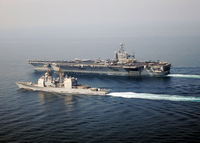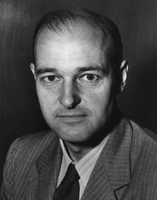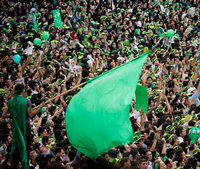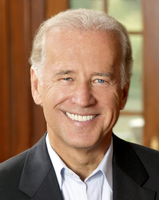On Monday, I flagged Secretary of State Hillary Clinton’s remarks on Meet the Press, in which she declared that Iran “[does] not have the right to have the full enrichment and reprocessingcycle under [its] control.” That seemed to be the most expansive and, perhaps more significantly, the least vague pronouncement on the subject that I’d seen by an Obama administration official to date. Compare it, for instance, to Obama’s language in his Prague speech: We will support Iran’s right to peaceful nuclear energy with rigorousinspections. That’s a path that the Islamic Republic can take. Or thegovernment can choose increased isolation, […]
Iran Archive
Free Newsletter
A friend pointed me in the direction of Secretary of State Hillary Clinton’s Meet the Press appearance yesterday (video here, transcript here). And I, like he, was suitably impressed by the tone and professionalism. I never gave in to the Hillary demonization during the primary campaign. As things turned out, we got what I think is a very competent president and secretary. I think, had she won, we would have gotten the same thing. That said, I only found one remark “significant,” in terms of both raising my eyebrows and adding an element to my thinking about the administration’s policies. […]
Six months after he ascended to the presidency of the United States, Barack Obama can point to a distinct new tone in American foreign policy and the start of a discernible makeover of the country’s image around the globe. When it comes to specific achievements in the international arena, however, the administration does not have much to show, so far. The transformation of America’s global standing had already started even before the president moved into his new Pennsylvania Avenue address on Jan. 20. Two factors triggered the process. First, Obama replaced a man who had become extraordinarily unpopular throughout most […]

The aftermath of Iran’s June 12 presidential election — and in particular, the violent repression of opposition protests — has brought the Obama administration’s stated goal of engaging with the Iranian regime into question. Even if President Barack Obama decides to follow through with efforts to engage Tehran, many observers anticipate that the Iranian leadership will take an even tougher approach to negotiations over its nuclear program. The U.S. has not ruled out the possibility of military strikes to induce Iran to abandon its presumed goal of acquiring nuclear weapons, should diplomacy and sanctions fail. And a more recalcitrant Iranian […]
For anyone who enters the site through the blog, I very strongly urge you to take a look at the new WPR feature issue, Back to the Future, that just went live today. It’s a really fascinating examination by three insightful foreign policy voices of the continued relevance of some tried-and-true, but nevertheless abandoned, foreign policy approaches from America’s recent history. Michael Cohen explains why the Powell Doctrine is more appropriate today than ever.Eugene Gholz examines how the Nixon Doctrine could be applied to address America’s current strategic challenges. And Robert Litwak discusses why Containment is as valid an approach […]
I didn’t see any major notice of this in the American press, but the Times (UK) reported last week that the director of Iran’s nuclear program, Gholam Reza Aghazadeh, resigned. Aghazadeh was a political ally of Mir Hossein Moussavi and also closely aligned with Ali Rafsanjani. More importantly, he was an able and effective administrator of Iran’s nuclear program for 12 years, leading the Times to speculate that his resignation was a setback for Iranian President Mahmoud Ahmadinejad. I initially had a less optimistic take, wondering whether his departure didn’t leave an opening for Ahmadinejad to fill with a hardliner. […]

Upon taking office in January 2009, in addition to inheriting ongoing wars in Iraq and Afghanistan, President Barack Obama also inherited twin nuclear crises with North Korea and Iran. North Korea conducted its second nuclear test in May 2009, while Iran continues to flout U.N. Security Council resolutions requiring the suspension of its uranium enrichment program, which the United States and other countries believe is central to Tehran’s clandestine effort to acquire nuclear weapons. The nuclear crises are playing out against the backdrop of potentially significant societal developments in both countries. In North Korea, a stroke reportedly suffered by Kim […]

Last week’s much-anticipated Friday sermon by Akbar Hashemi Rafsanjani confirmed that the protests and resistance in Iran are no longer about the much-disputed June 12 presidential election. Despite post-election speculation on the prospects for a second Iranian revolution, the current situation more closely resembles a civil rights movement — one emerging organically from within the framework of the country’s constitution. In many respects, this mirrors the choice that increasingly emerged for Iranian voters in the final weeks of the election campaign, between a more pragmatic and measured approach — offered most visibly by Mir Hossein Moussavi — and the almost […]
According to McClatchy (via Friday Lunch Club), no quid and no quo regarding yesterday’s release of the five Iranian detainees in Iraq. In fact, U.S. forces handed them over to Iraqi authorities despite misgivings. This is a case where Iraqi Prime Minister Nouri al-Maliki is flexing some muscle in his newly “autonomous” relationship with the U.S. That, of course, is to be expected, and to the extent that it hastens realistic expectations Stateside for U.S.-Iraq relations moving forward, it is a good thing. Michael Wahid Hanna’s WPR Briefing was especially insightful on that subject. But those who will point to […]

Sources inside Iran say that the opposition movement that returned to the streets yesterday is no longer driven by electoral loyalties, but by a rejection of the “election coup” that concentrated power in a small and radical faction of the Iranian political elite. While the causes of popular discontent are relatively easy to trace, explaining the struggle within the establishment is less straightforward. Two interpretations have emerged as the dominant narratives. The first focuses on the tug-of-war between Supreme Leader Ali Khamenei and Akbar Hashemi Rafsanjani, the chairman of the Expediency Council and Assembly of Experts. Both men are historical […]
I’d thought of the five Iranians detained in Iraq a few weeks back, in the aftermath of the Iranian elections. It occurred to me then that liberating them would be a way to offer a concrete goodwill gesture to Tehran, thereby providing a bit more liberty of action in terms of offering moral support to the Iranian opposition. According to the Washington Post and the Times of London, they were released today as part of the detainee-release agreement with Baghdad. Kevin Sullivan wonders if it’s the quid for Iran’s quo of releasing some of the protestors who had been detained […]

Vice President Joe Biden lived up to his “talks before he thinks” reputation once again, when he told an interviewer that the United States would not stop Israel if it decided to attack Iran’s nuclear installations. “Israel can determine for itself — it’s a sovereign nation — what’s in their interest and what they decide to do relative to Iran and anyone else,” Biden said on a weekend talk show. Political analysts decided this was another Bidenism, which President Barack Obama would soon have to correct. Sure enough, a couple of days later the president, during his visit to Moscow, […]

For years, Iran watchers and Iranian opposition leaders, most of whom are exiled in the West, have pointed to the discontent swelling below the surface of Iranian society. Evidence of Iranian discontent was visible in the country’s massive drug problem and in the sporadic protests born of economic hardship and rising unemployment. The huge popularity of the Persian blogosphere, used as a way around restrictions on freedom of expression, was another clear sign of the national mood. The question no one was able to answer was how to engage with that mood in order to unify the disparate visions for […]
